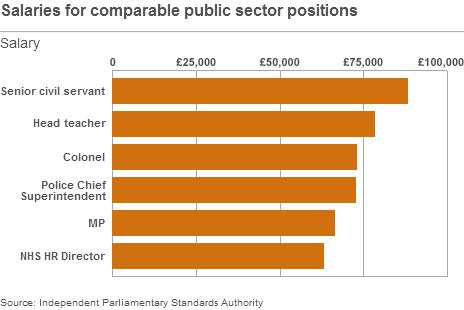Nick Clegg: I wouldn't take pay rise for MPs
- Published
- comments
Nick Clegg: "It would be impossible to explain to the public why MPs should be treated so differently"
Deputy Prime Minister Nick Clegg has said he would not take a big pay rise even if one is recommended for MPs.
He said people whose living standards were being "remorselessly squeezed" would find a big rise for MPs "impossible to understand".
The Independent Parliamentary Standards Authority is expected to say backbench MPs' £66,000 salaries should increase to more than £70,000 from the election.
Prime Minister David Cameron has said such a plan would be "unthinkable".
But the BBC's Nick Robinson said the PM could not block the recommendations and advisers had warned him MPs would reject any bid to do so in the Commons.
The BBC's political editor added that the Independent Parliamentary Standards Authority's (Ipsa) recommendation would be "likely to cause outrage from voters at a time when there is significant pay restraint in the public and private sectors".
'Show restraint'
Ipsa, which was set up as an independent body to regulate MPs' pay and pensions in the wake of the expenses scandal, is expected to announce its initial recommendations later this month.
MPs and members of the public will be able to take part in a consultation before Ipsa publishes its final plans - expected in the autumn - which would then come into force without the need for further legislation.
Reports in several newspapers this weekend suggest its initial recommendations will call for a rise of about 15% in the basic salary of a backbench MP from £66,396 to a sum closer to £75,000. MPs would, however, have to pay much higher contributions towards their pensions.
Asked about the reports of a proposed pay rise for MPs, Mr Clegg, the Lib Dem leader, said the recommendations were a matter for Ipsa and for MPs to decide themselves whether or not to take any rise.
Speaking in Pakistan, Mr Cameron said he did not know what Ipsa would say but added: "Whatever Ipsa recommends, we can't see the cost of politics or Westminster going up. We should see the cost of Westminster go down.
"Anything would be unthinkable unless the cost of politics was frozen and cut, so I'll wait and see what Ipsa have to say. What I said to Ipsa was that restraint is necessary."
The government could propose a motion calling for Ipsa's recommendations to be ignored, but Nick Robinson said this could "undermine the independence of the new system" and would be unlikely to win enough support from MPs.
Keith Vaz MP: "This has always been a point of contention"
And the Mail on Sunday reported that a source close to Labour leader Ed Miliband had said:, external "We will view any rise for MPs in the light of the current climate of economic austerity.
"It has to be seen in the context of the decision to limit public sector workers' pay increases to 1% and the fact that some private sector workers have had their pay cut."
The Commons voted against a 1% pay rise in 2011 and last year agreed to extend the pay freeze into 2013. MPs' salaries are due to rise to £67,060 from April 2014.

In an anonymous online survey of 100 MPs conducted for Ipsa - the results of which were published in January - 69% said they were underpaid. The average level suggested for the appropriate level of pay was £86,250.
'Last thing on earth'
Former Labour minister and chairman of the Home Affairs select committee Keith Vaz: "The last thing on earth MPs should be talking about is their own pay."
Former children's minister and Tory MP Tim Loughton: "This isn't going to happen. It would be completely inappropriate for us to accept it at the moment. It sends the wrong message to the rest of the country going through a tough time."
Matthew Sinclair, of the Taxpayers' Alliance, which campaigns for lower taxes, said there would be public outrage should the rises go ahead.
He said: "MPs are already very well paid both in terms of European politicians and the average salary in this country.
"It would be particularly egregious for politicians to be handed a whopping great pay rise while hard-pressed taxpayers tighten their own belts."
Former Labour minister Tom Harris called for Ipsa to be abolished and MPs to be given the final say on issues of parliamentary pay and expenses.
"If we're going to get the blame for rises in our salary, we might as well take the responsibility too," he wrote in the Daily Telegraph, external. "The complaints will continue, but at least they'll be aimed at the right people."
And he suggested efforts to cut the "cost of politics" were futile. "Running a modern parliament in the 21st Century costs money. And if it doesn't, you're not doing it right."
MPs are paid more than their counterparts in Spain and France but less than legislators in the Republic of Ireland, Germany and Italy. An Ipsa study in 2012 found the mean average for pay across major democracies was just over £86,000.
- Published1 July 2013
- Published10 January 2013